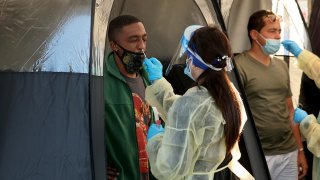
With news centered currently around surging omicron cases, many are wondering what happened to the delta COVID variant that had been the dominant strain in the U.S. for several months?
According to Chicago's top doctor, Chicago Department of Public Health Commissioner Dr. Allison Arwady, the delta variant "has been what we call out competed by omicron."
"Meaning that because omicron is so much more infectious, so much more contagious, that it has had the opportunity to spread very, very quickly and we see it sort of replaced delta," she said during a Facebook Live Tuesday.
As of Wednesday, Arwady said just 0.7% of the city's cases were believed to be caused by the delta variant.
Feeling out of the loop? We'll catch you up on the Chicago news you need to know. Sign up for the weekly Chicago Catch-Up newsletter here.
"You can see 99.3% is the estimate of all of the COVID cases are the omicron variant and just 0.7% are delta and nothing else is showing up at this point," she said.
But the effects of the delta variant are still being felt in the U.S. even as omicron surges.
Last week, Dr. Rochelle Walensky, director of the Centers for Disease Control and Prevention, said most reported COVID deaths in the U.S. were still from the delta variant.
Speaking at the White House COVID-19 Response Team briefing Wednesday, Walensky said she expects most of the recent spike in fatalities are lagging deaths from the delta variant wave.
The seven-day rolling average for daily new COVID-19 deaths in the U.S. has been trending upward since mid-November, reaching nearly 1,700 on Jan. 17 — still below the peak of 3,300 in January 2021. COVID-19 deaths among nursing home residents started rising slightly two weeks ago, although still at a rate 10 times less than last year before most residents were vaccinated.
Experts warn, however, that with deaths often lagging behind infections, the impact of omicron remains uncertain.
"The changes that we saw in omicron, it's the virus just wants to survive, right?" Arwady said. "It's just like any other organism. And so the fact that it can out compete means that you will see that one take charge. So will [delta] completely disappear? I think time will tell."
Arwady noted that the original variant of COVID-19 that first arrived in the U.S. in 2020 is no longer being detected in Chicago.
"We never detect anymore the very original versions of COVID, like the one that was originally detected in Wuhan," she said. "We never detect that variant anymore."
That doesn't mean that variants are over, however.
Arwady added that additional variants are possible going forward - and other health experts agree.
Getting progressively better at evading immunity helps a virus to survive over the long term. When SARS-CoV-2 first struck, no one was immune. But infections and vaccines have conferred at least some immunity to much of the world, so the virus must adapt.
"The faster omicron spreads, the more opportunities there are for mutation, potentially leading to more variants,” Leonardo Martinez, an infectious disease epidemiologist at Boston University, said.
When new variants do develop, scientists said it’s still very difficult to know from genetic features which ones might take off. For example, omicron has many more mutations than previous variants, around 30 in the spike protein that lets it attach to human cells. But the so-called IHU variant identified in France and being monitored by the WHO has 46 mutations and doesn’t seem to have spread much at all.
What will happen next, remains to be seen.
"If the virus itself didn't change, we could do a pretty good job of I think predicting what would happen," Arwady said. "As the virus continues to have opportunities to mutate and change, which especially it can do in parts of the world that are less vaccinated, or parts of the city that are less vaccinated, in turn that gives it more opportunities to be able to evade, you know, natural immunity, vaccine-induced immunity. And it just wants to have survival. So the next couple of months are going to be really interesting to see."

